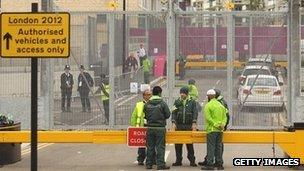London 2012: G4S encouraged to keep staff wages low
- Published

G4S were contracted to supply 10,400 security guards during the Games
Olympic organisers instructed G4S to pay security guards less than the wages that officials had publicly declared were being offered, the firm says.
Most security guards are being paid a basic wage of £8.50 an hour to work at the Games venues.
It is below the rate of "approximately £10 an hour" which the government and Locog told MPs was being paid to attract recruits.
Locog said pay and retention rates started at more than £9 an hour.
The pressure to keep down wages has emerged as another factor which may have prevented G4S from meeting its contractual obligation to supply 10,400 security guards for the Games, leading to 3,500 extra armed forces personnel being drafted in.
Enhanced contract
More military personnel may yet be needed.
G4S says the basic rate - being paid to about half the security workforce - was decided by Locog when a new enhanced contract was signed last December.
A spokesman said: "The minimum rate of pay was £8.50 an hour and rises on a scale from there depending on the role's seniority and whether specialist skills are required."
A company source has told the BBC that it was "imposed" on the company and there was no scope to deviate from it.
Locog's chief executive Paul Deighton told MPs on the Public Accounts Committee (PAC) last December that security guards would be paid at the market rate of between £9 and £12 an hour.
Serious questions
In March this year Jonathan Stephens, Permanent Secretary at the Department for Culture Media and Sport and the official in overall charge of the £9.3bn Olympic budget, gave updated figures to the committee.
In written evidence he said: "With regards labour costs, budgeted hourly pay rates have been jointly developed between Locog and G4S following extensive market research and discussion.
"Pay starts at approximately £10 per hour, to which have been added associated costs such as NI [national insurance] and holiday pay, with supervisory or specialist staff being paid at a higher rate."
The chairman of the PAC Margaret Hodge MP said it raised "serious questions" about Locog's management of the contract.
Mr Stephens told MPs that G4S had been "incentivised to identify savings opportunities in labour costs", implying the company would keep more for itself if it kept wage costs down.
But the G4S source said there had been "no incentive" because the rate was fixed.
"The rate was imposed on us. We are just the agents and did not decide the pay structure," said the source.
Bonus payments
The security contract entitled G4S to a small amount for every employee paid the £8.50 basic hourly rate.
Last week, in an attempt to sign up and retain staff, the company offered bonus payments of between 50p and £1 an hour for those who stayed in their jobs until the end of the Games.
A spokesman for Locog said: "The combined pay and retention rate starts at over £9 per hour.
"The more senior the role, the higher the rate."
G4S has blamed its failure to deliver enough security staff on problems with the "scheduling", communication and training workloads.
But it is likely the rate of pay may also have had an impact, as people considered a range of alternative casual job opportunities, especially in the retail and hospitality sectors, which have become available during the Olympics.
The source said: "We discussed whether if we paid more it would increase our chances of attracting more people.
"But we didn't complain and we accepted the rate."
Ms Hodge said she would be demanding to see the security contract when the PAC reconvenes in September.
She questioned why security staff, some of the poorest people in London, were being paid apparently less than the market rate and not what the committee had been told.
She said it could not be justified when the money G4S said it needed for managing the contract - including spending on office, administrative staff, training and uniforms - had risen from £10m to £125m.
- Published19 July 2012
- Published18 July 2012
- Published18 July 2012
- Published17 July 2012
- Published7 January 2014
- Published16 July 2012